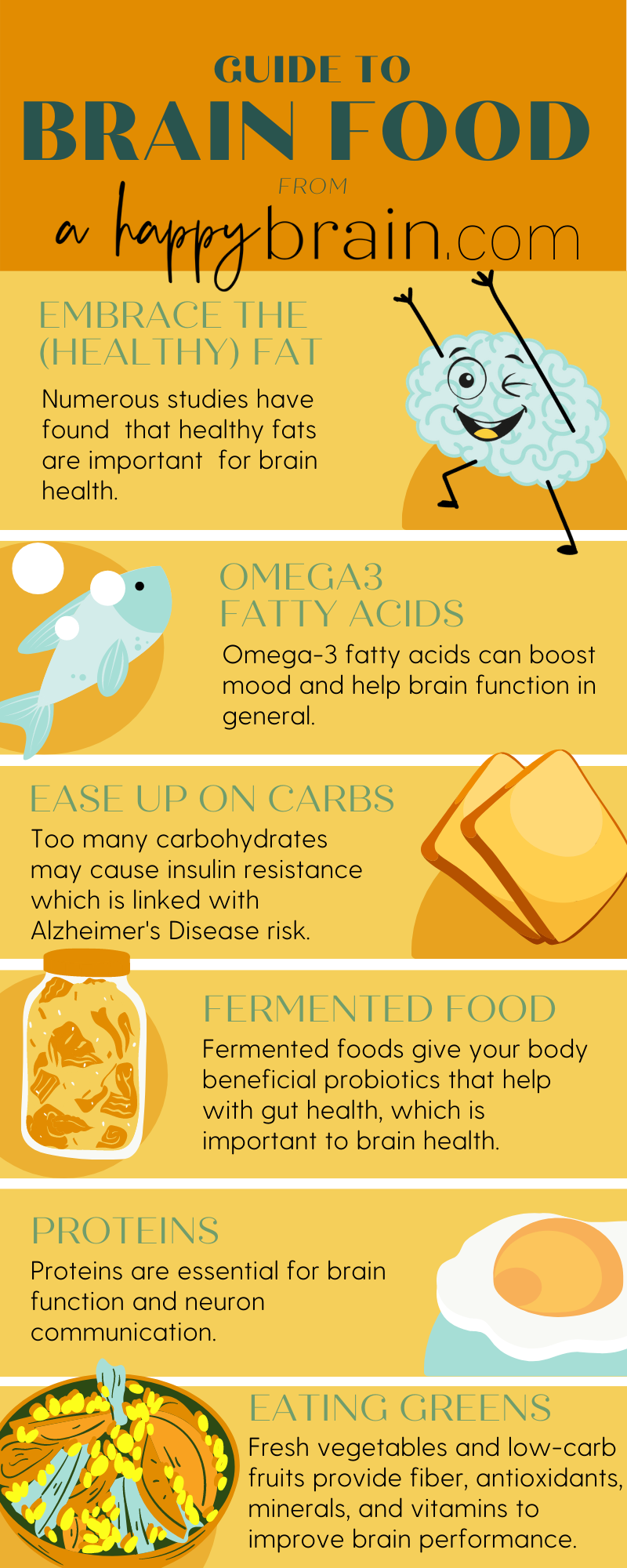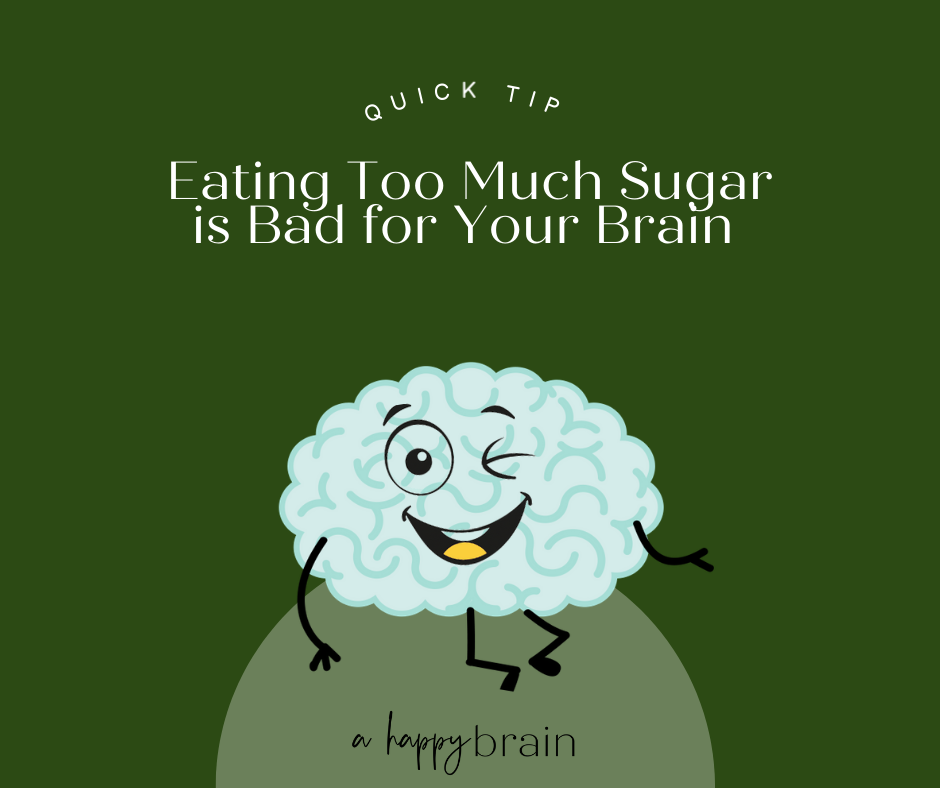Here’s some food for thought! In previous articles, I talked about how sleep can affect your brain. I also covered how to get a good night’s sleep. However, no matter how well you sleep, if you eat the wrong foods, it’s going to be difficult to get your brain functioning at its best. The food you eat can also affect your mood, memory and brain function. In fact, when I look at the research to find lifestyle changes that ensure our brain cells stay in tip-top condition, diet often emerges top of the list.
Here at A Happy Brain, we’re committed to finding and sharing natural and accessible strategies to improve our brain health. And what simpler and more pleasurable way to improve our well-being than to enjoy delicious, nutritious meals?
In this article, I’ll give an overview of basic foods that research suggests give your brain the nutrition it needs to function at its best. These fundamental foods may help your memory stay sharp and clear. They may also help with mood and mental processing. While I’m covering the basics today, in future articles I’ll delve a little deeper into specific foods, and their individual benefits. Read on for some food for thought!

Don’t Fear the Fat–It’s important Food for Thought
When it comes to the health of your brain, fat is where it’s at! With low-fat dieting trends, it’s easy to feel like fat is your enemy, but scientists have shown that our ancestors ate a high fat diet1 (when they could get it). Thankfully, low-fat diets are starting to fall out of favor with many nutritional experts. I’ll talk about this more in a future article.
Interestingly, increasing the fat intake in our ancestor’s diets may have had an impact on the development of the human brain. In fact, a study from Yale University in 20152 hypothesized our ancestors ate animal fats from the bone marrow of the bones left behind by other animals. These fats may have accelerated the growth of the human brain long before we started to kill and eat large quantities of meat.
It’s no surprise that fats are important to brain health. the brain is, after all, estimated to be made of about 60% fat. In addition, numerous studies have found that fats play a major role in the health of your brain and nervous system. Let’s see why.
Cholesterol – An Unlikely Ally?
First of all, let’s take a look at the cholesterol. Is it the devil? We hear about how high levels of cholesterol block up arteries (including those to our brain) and increase the risk of heart problems. However, like many topics in nutrition, cholesterol is controversial.
Why do we need cholesterol?
One thing experts do agree on is that without cholesterol we would die. We need cholesterol to make hormones like estrogen and testosterone as well as vitamin D and the bile we need to digest fats. In fact, cholesterol makes up an important component of cell membranes throughout the body.
Cholesterol in the brain
Cholesterol is so important to the brain that over 25% of our total cholesterol is located there. Our brain and nervous system uses most of this cholesterol in the myelin, the insulation that allows lightning fast messaging.
Cholesterol travels through the body on carriers, called lipoproteins. It is these lipoproteins that determine the “type” of cholesterol. While there are many different types of these carriers, we most often hear of two types, “LDL” and “HDL” (low-density lipoprotein and high-density lipoprotein). Of these types LDL bears the brunt of the negative press. However, even LDL has been found to be beneficial to certain bodily processes3.
Cholesterol has been shown to be very important in the long term health of our brains. In fact, a direct link was found4 between cholesterol levels and cognitive performance as people age. The subjects of the study were tested for things like memory, abstract reasoning, concentration and word fluency. The study found that those with low levels of cholesterol performed notably worse.
Another study5, this time of people over 85, showed that higher cholesterol resulted in higher memory scores. Unfortunately not all studies6 agree on this positive relationship between higher cholesterol levels and better brain function.
Where does cholesterol come from?
When I mention the sources of cholesterol, you might start thinking about animal fats, bacon, eggs, butter and cheese. While these food items do indeed have some cholesterol, most of the cholesterol in the body doesn’t come from our food at all, but is created from within.
Interestingly, cholesterol from the body cannot pass into the brain. Instead, certain types of brain cells produce the cholesterol the brain needs. Because of this, loading your plate with cholesterol-heavy foods isn’t likely to increase the cholesterol in your brain.
What does this mean?
So, it seems, as with nearly everything in life, that there is a happy medium. It seems that avoiding cholesterol in foods may have less of an impact on our health than we have been led to believe. Instead, other factors in our diet and lifestyle may dictate our cholesterol levels and types of protein carriers. While there may be a positive connection with cholesterol and brain function, clearly more research is needed.
Omega 3 Fatty Acids
Fish and fish oil has long been considered food for thought. This idea continues to be supported by scientific research. For example, a large French study, shows that Omega 3 fatty acids may decrease the likelihood of developing dementia7.
Ever tried swallowing a spoon of cod liver oil? If you have, you’ll understand the revulsion I’m feeling even writing about it. If not, then don’t! There are far more pleasant ways to get those super healthy Omega 3 fatty acids into your diet.
The best ways to include these in your diet is by consuming ‘fatty’ fish such as mackerel, salmon, and sardines. One important thing to keep in mind, however, is that big sea predators like tuna end up ingesting and capturing a large amount of mercury over their lifetimes, and mercury is notoriously bad for your brain.
If you don’t fancy fish, why not eat what (some) fish eat—seaweed! Microalgae has proven to be nearly as rich in Omega3 as fatty fish8, and you don’t even have to scavenge the seashore to find it—you can now buy it in bottles!
You can also find Omega 3 fatty acids in many other totally vegetarian sources, such as chia seeds, brussels sprouts and walnuts. Your body can convert the fats in these sources to Omega 3’s, but there is some scientific discussion9 as to how effective this conversion is, and whether everyone is capable of it.
For those meat-eaters among us, remember that grass-fed meat is also a good source of Omega 3 Fatty Acids,10 but nowhere near as rich as salmon, for example.
Don’t underestimate the effects of Omega 3 fatty acids on the brain. Not only do these fatty acids protect against dementia, studies show that they may alleviate mood disorders such as depression11 and anxiety12.
Next on the Menu, Proteins
Protein is vital for our diets, as it is what builds and repairs tissue. It’s also essential for getting nutrients to your brain cells13, In fact, proteins are made up of amino acids which neurons use for communication.14
When it comes to taking in healthy proteins, grass-fed beef is far superior to grain-fed. The fats in grass-fed beef are much healthier all around.15 Grass-fed beef contains as much as five times more of our old friend, Omega 3 fatty acids. In addition these healthy fats, this beef also delivers more vitamins and antioxidants than grain-fed.
When choosing good proteins for your brain health, it’s important to pick non-inflammatory proteins16. Grain-fed animal proteins are more inflammatory than fish or vegetable proteins, so keep that in mind when doing your grocery shopping. Think wild Alaskan salmon, eggs from pastured chickens, and nuts.
Take it Easy on the Carbs
When it comes to long term brain health, carbohydrates are best kept to a minimum. Research has clearly shown that a low-carb diet can improve memory and brain function in people with Alzheimer’s17.
Also, worryingly, carb-heavy eaters have nearly four times the risk of developing mild cognitive impairment18, which some consider a precursor to Alzheimer’s disease. Studies show that eating a low-carb diet may also lower insulin resistance, and insulin resistance has also been linked with Alzheimer’s19.
Carbohydrates are so intertwined with brain health that I’m going to dedicate a whole article to one type of carb— sugars–which you can read next week.
For now, try to lower your intake of bread, white rice, and sugar-laden baked goods. Stick with low-carb fruits like berries, and vegetables that are grown above the ground like spinach, cauliflower and kale.

Eat your Greens!
Eating fresh fruit and vegetables gives you a whole raft of health benefits. Among them, you’ll be happy to know, is improved brain performance. Here are just some of the reasons why:
- Flavonoid antioxidants in berries improve memory and general cognitive performance20
- The minerals and vitamins in fruit and vegetables, such as Vitamin K, improve overall brain health21.
- High fiber fruit and vegetables feed good bacteria in your gut. Keeping these bacteria healthy may play a role in gut-brain communication. I’ll cover this topic in a future post.
Keeping in mind what we just learned above, it’s important to choose low-carb fruits and vegetables.
Also, avoid too much fructose..22 Studies link this type of sugar to fatty liver diseases and increased triglyceride levels. Fructose hides in high levels most fruit juices, soft drinks, and certain sweeteners like agave syrup. In fact, table sugar is 50% fructose.
.
Fermented Food for Thought
As we mentioned above, looking after your gut bacteria can directly benefit the wellbeing of your brain. Researchers have found direct links between gut health and cognitive performance, with a particular focus on fermented foods23.
The best fermented foods are those that aren’t laced with extra sugar. Unsweetened Greek yogurt, sauerkraut, kombucha and (a favorite of mine) kimchi are all great options. You can even make your own fermented foods. For example, here is a great recipe for Kimchi.
While fermented foods are loaded with good bacteria, canned fermented foods don’t pack the same punch. Remember that canning uses a lot of heat. This heat will kill the good bacteria in the food. Because of this, canned ferments won’t help keep your gut, and thereby your brain, as healthy as possible. Therefore, instead of eating canned ferments, opt for freshly fermented foods.
Feed Your Mind
As I hope I’ve made clear, diet is a hugely important element of a lifestyle that ensures your best brain health and happiness. There’s no doubt that your diet affects the health of your brain and your cognitive performance in general. Here’s one more study on the subject, in case you haven’t read enough scientific literature for one day!
On a final note, I’d like to acknowledge that not all foods will benefit all people. This is because we are biologically complex beings, and each of us has a unique body. For example, many people have sensitivities and allergies, and it is very important that they stay away from the foods that cause them inflammation.
I hope this article gives you some food for thought. As mentioned, in future posts we’re going to take a much closer look at individual foods, and how they can help to protect the condition of your brain throughout life, and especially as we reach our more “senior” years. We hope to see you there!
Dr. Annissa Slusher
References:
1. https://pubmed.ncbi.nlm.nih.gov/20860883/
2. https://www.sciencedaily.com/releases/2019/02/190205161420.htm
4. https://pubmed.ncbi.nlm.nih.gov/15673620/
5. https://pubmed.ncbi.nlm.nih.gov/18757771/
6. https://pubmed.ncbi.nlm.nih.gov/PMC5240556/
7. https://pubmed.ncbi.nlm.nih.gov/17998483/
8. https://pubmed.ncbi.nlm.nih.gov/18220672/
9. https://www.ncbi.nlm.nih.gov/pmc/articles/PMC6835948/
11. https://www.ncbi.nlm.nih.gov/pmc/articles/PMC6683166/
12. https://www.ncbi.nlm.nih.gov/pmc/articles/PMC6324500/
13. http://pressbooks-dev.oer.hawaii.edu/humannutrition/chapter/proteins-functions-in-the-body/
17. https://www.healthline.com/nutrition/low-carb-ketogenic-diet-brain#TOC_TITLE_HDR_6
18. https://pubmed.ncbi.nlm.nih.gov/22810099/
19. https://pubmed.ncbi.nlm.nih.gov/30538427/
21. https://www.ncbi.nlm.nih.gov/pmc/articles/PMC6836211/
22. https://www.ncbi.nlm.nih.gov/pmc/articles/PMC2991323/
23. https://www.ncbi.nlm.nih.gov/pmc/articles/PMC5216880/ 24. https://www.ncbi.nlm.nih.gov/pmc/articles/PMC2805706/


Thank you so much for these articles. My mother has advanced dementia so I have developed an interest in keeping my brain healthy. You explain things very well and I’m really looking forward to future posts from you.
I’m so sorry. Dementia is one of the biggest reasons I developed this site. One of my goals is to give people the tools they need to give them their best chance to prevent dementia.
Dr. Slusher